Related Research Articles

Ragtime, also spelled rag-time or rag time, is a musical style that had its peak from the 1890s to 1910s. Its cardinal trait is its syncopated or "ragged" rhythm. Ragtime was popularized during the early 20th century by composers such as Scott Joplin, James Scott, and Joseph Lamb. Ragtime pieces are typically composed for and performed on piano, though the genre has been adapted for a variety of instruments and styles.

Charles Joseph "Buddy" Bolden was an American cornetist who was regarded by contemporaries as a key figure in the development of a New Orleans style of ragtime music, or "jass", which later came to be known as jazz.

A jug band is a band employing a jug player and a mix of conventional and homemade instruments. These homemade instruments are ordinary objects adapted to or modified for making sound, like the washtub bass, washboard, spoons, bones, stovepipe, jew's harp, and comb and tissue paper. The term 'jug band' is loosely used in referring to ensembles that also incorporate homemade instruments, but that are more accurately called skiffle bands, spasm bands, or juke bands because they do not include a jug player.

Willie Gary "Bunk" Johnson was an American prominent jazz trumpeter from New Orleans.
The music of Louisiana can be divided into three general regions: rural south Louisiana, home to Creole Zydeco and Old French, New Orleans, and north Louisiana. The region in and around Greater New Orleans has a unique musical heritage tied to Dixieland jazz, blues, and Afro-Caribbean rhythms. The music of the northern portion of the state starting at Baton Rouge and reaching Shreveport has similarities to that of the rest of the US South.
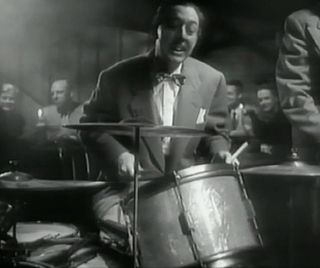
Ray Bauduc was an American jazz drummer best known for his work with the Bob Crosby Orchestra and their band-within-a-band, the Bobcats, between 1935 and 1942. He is also known for his shared composition of "Big Noise from Winnetka," a jazz standard.
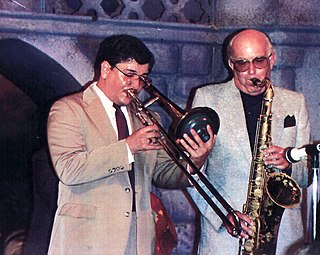
Dan Barrett is an American arranger, cornetist, and trombonist.
Keith Nichols was an English jazz multi-instrumentalist and arranger, a player of the piano, trombone, reeds, and accordion.

Lionel Charles Ferbos was an American jazz trumpeter. He was from New Orleans, Louisiana.

Lars Ivar Edegran is a Dixieland jazz musician and bandleader from Sweden. He most often plays piano, guitar, or banjo but has also played mandolin, clarinet, and saxophone.
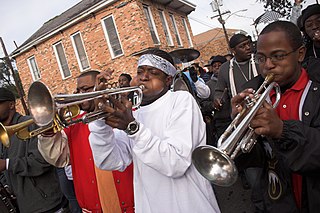
The music of New Orleans assumes various styles of music which have often borrowed from earlier traditions. New Orleans, Louisiana, is especially known for its strong association with jazz music, universally considered to be the birthplace of the genre. The earliest form was dixieland, which has sometimes been called traditional jazz, 'New Orleans', and 'New Orleans jazz'. However, the tradition of jazz in New Orleans has taken on various forms that have either branched out from original dixieland or taken entirely different paths altogether. New Orleans has also been a prominent center of funk, home to some of the earliest funk bands such as The Meters.
Chris Tyle is dixieland jazz musician who performs on cornet, trumpet, clarinet and drums.

The soundtrack to the film Pretty Baby used many local New Orleans musicians playing in the jazz, ragtime, and blues style of the city in the early 20th century. An LP album of the soundtrack, also entitled Pretty Baby, was issued in 1978 on ABC Records. The film is named after the song "Pretty Baby" by Tony Jackson.
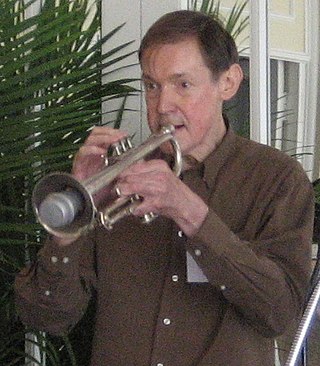
Peter Ecklund was an American jazz cornetist.
Dixieland jazz, also referred to as traditional jazz, hot jazz, or simply Dixieland, is a style of jazz based on the music that developed in New Orleans at the start of the 20th century. The 1917 recordings by the Original Dixieland Jass Band fostered awareness of this new style of music.
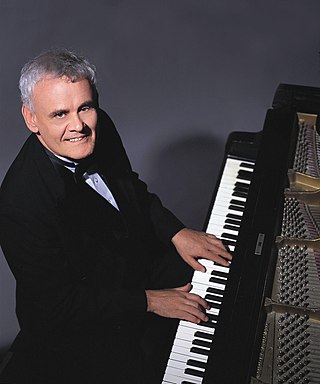
Terry Waldo is an American pianist, composer, and historian of early jazz, blues, and stride music, and is best known for his contribution to ragtime and his role in reviving interest in this form, starting in the 1970s. Says Wynton Marsalis in his introduction to Waldo's book: "He teaches Ragtime, he talks about Ragtime, he plays it, he embodies it, he lives it, and he keeps Ragtime alive." The book, This is Ragtime, published in 1976, grew out of the series of the same title that Waldo produced for NPR in 1974. Waldo is also a theatrical music director, producer, vocalist, and teacher. He is noted for his wit and humor in performance, as "a monologist in the dry, Middle Western tradition." Eubie Blake describes his first impression of Waldo's performance thus: "I died laughing...that's one of the hardest things to do—make people laugh. Terry's ability to do this, combined with his musicianship, actually reminds me of Fats Waller."

The history of jazz in Belgium starts with the Dinant instrument maker Adolphe Sax, whose saxophone became part of military bands in New Orleans around 1900 and would develop into the jazz instrument par excellence. From then on the early history of jazz in Belgium virtually runs parallel to developments in the country of the birth of jazz, from the minstrel shows in the late 19th century until the first Belgian jazz album in 1927 and beyond.

Tuba Skinny is a traditional jazz street band based in New Orleans, Louisiana. The band's instrumentation includes cornet, clarinet, trombone, tuba, tenor banjo, guitar, frottoir, and vocals. The ensemble draws its inspiration from the early jazz, ragtime, and blues music of the 1920s and 1930s. The group began as an itinerant busking band and has performed around the world, including at music festivals in Mexico, Sweden, Australia, Italy, France, Switzerland, and Spain.

James Brown Humphrey, also known as "Professor Jim" Humphrey (1859–1937) was an American classical musician, dance band leader, and music instructor in New Orleans, Louisiana, and central figure in the formation of jazz as a contemporary musical art form. Humphrey predates the jazz genre as an active performer and is not himself considered a jazz musician. However, his involvement in the formal training of large numbers of musicians along the southern plantation belt of the Mississippi River delta during the immediate years following the reconstruction era resulted in many virtuoso performers who would go on to originate jazz as a distinct musical genre. Consequently, he is regarded by some in the jazz aficionado community to be "the grandfather of jazz".

Tom Roberts is an American pianist, composer, and arranger, a specialist in the stride piano style, and a expert on early jazz piano and jazz recordings. Tom is a master of all early jazz piano styles including ragtime, boogie woogie, swing, New Orleans jazz, and Harlen Stride piano.
References
- ↑ Kennedy, Gary W. (2003). "Stomp Off". Grove Music Online (8th ed.). Oxford University Press. doi:10.1093/gmo/9781561592630.article.J792700. ISBN 978-1-56159-263-0.
- 1 2 3 Wilson, John S. (May 18, 1986). "Modern Jazzmen Revive the Past". The New York Times . Retrieved August 7, 2022.
- 1 2 Wilson, John S. (November 18, 1984). "New Label Captures an Old Jazz Style". The New York Times. Retrieved August 7, 2022.
- 1 2 Senior, Andy (May 1, 2017). "Bob Erdos, 86, Championed Traditional Jazz". Syncopated Times. Retrieved August 7, 2022.